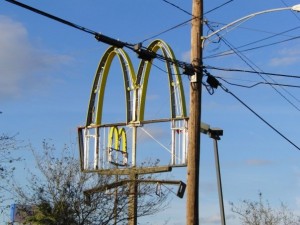Last Friday I read an innocent enough tweet from @Slate:
Tornado outbreak now the worst US natural disaster since Katrina:http://slate.me/m8ZWnN – Apr 29 2011
My first reaction was “wow, those tornados were nasty.” Which is, i’m sure, how it was intended. Then I thought “worst? what are they using to determine badness?” Of course, this was somewhat of a second-level headline. The main headline said it was the “deadliest US natural disaster”. So the manager of the twitter account had taken the step from death = worst (i tweeted a response), which the author (Josh Voorhees) of the article likely didn’t mean to imply.
I’m sure the economic impact of Hurricane Ike was much greater than that of the recent tornados. Tornados are pinpoint, one block can be toothpicks the next unharmed. Hurricanes paint with big brushes, but thankfully we get advanced warning which mitigates deaths. I’m would guess that Ike left more homeless as well. (Death tolls: Katrina ~1800, Ike ~200, recent tornadoes ~300+)
Not wanting to figure a calculus for death vs. destruction, I soon focused in on “natural disaster”. Hurricane Katrina, like Hurricane Ike, was itself a weather event, and caused a natural disaster. But the Flooding of New Orleans was not a natural disaster. It was caused by the breaching of a human-made levee, a combination of engineering and bureaucratic failure. I would certainly not attribute all those deaths to “natural disaster”.
Was the collapse of the I-35 bridge in Minneapolis a natural disaster? Certainly the elements caused it to deteriorate, but I think all of us would answer “no”.
The recent earthquake-tsunami combination in Japan was certainly a natural disaster. Was the subsequent Chernobyl-sized welt-down and the economic and possible death toll? I would certainly say “no”.
So, I ask again, was the Flooding of New Orleans a natural disaster? The only answer can be no!
